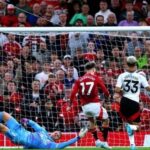Manchester United has a significant weakness that’s being overlooked.
Manchester United’s Overlooked Weakness: A Critical Analysis**
Manchester United, one of the most storied football clubs in history, has long been a subject of intense scrutiny and analysis. While the club’s on-field performances and managerial decisions often dominate headlines, there is one significant weakness that has been persistently overlooked: their lack of squad depth.
### The Depth Dilemma
Squad depth is crucial for sustained success, especially in a demanding season filled with domestic and international competitions. Manchester United’s struggles in this area have become increasingly apparent. While the starting eleven often features top-tier talent, the drop-off in quality when key players are rested or injured is noticeable.
### Key Areas of Concern
1. **Inconsistent Performance from Substitutes:**
The bench strength at Manchester United has been questioned for some time. The quality and impact of substitutes often fall short of what is required to maintain performance levels. When key players like Bruno Fernandes or Marcus Rashford are unavailable, the team lacks a reliable alternative capable of stepping up with the same level of influence.
2. **Injury Management:**
Injuries have plagued Manchester United in recent seasons, but the inability to effectively replace injured stars has been a recurring issue. While the club has made significant investments in player acquisitions, the new signings often struggle to make an immediate impact or adapt to the team’s playing style, exacerbating the problem of insufficient squad depth.
3. **Youth and Developmental Talent:**
Manchester United has a rich history of nurturing young talent, yet there seems to be a disconnect between the club’s renowned youth academy and the first team. Promising young players are not always integrated into the squad effectively, leaving gaps that are not filled by emerging talent when the senior players are unavailable.
### Potential Solutions
To address this weakness, Manchester United needs to invest in building a more balanced squad with quality options available across all positions. This means not only securing high-caliber players but also ensuring that there is a strategic plan in place to integrate and rotate them effectively.
1. **Strategic Signings:**
Targeting versatile players who can perform in multiple positions can help mitigate the impact of injuries and suspensions. Additionally, focusing on players with a proven track record of performing under pressure can be beneficial.
2. **Youth Integration:**
Developing and promoting young talent from the academy should be a priority. Creating a clear pathway for these players to contribute to the first team can provide much-needed depth while aligning with the club’s long-term vision.
3. **Effective Rotation Policy:**
Implementing a rotation policy that ensures players are rested and injuries are managed effectively can help maintain high performance levels throughout the season. This requires careful planning and a deep understanding of player fitness and form.
### Conclusion

Manchester United’s ongoing challenges with squad depth highlight a critical area that requires attention. While the club has made strides in various aspects, addressing this weakness is essential for achieving sustained success in both domestic and international competitions. By focusing on strategic signings, integrating young
TRENDING SONGS
 Trending Video: Muslim Man Joins Wife in Hallelujah Challenge ‘Dress Like Your Miracle’ Night
Trending Video: Muslim Man Joins Wife in Hallelujah Challenge ‘Dress Like Your Miracle’ Night
 Woman Seeks Advice as Late Brother’s Wife Refuses to Mourn Him Following His Death With Alleged Mistress
Woman Seeks Advice as Late Brother’s Wife Refuses to Mourn Him Following His Death With Alleged Mistress
 Nobody Cares About Fine Girls In The UK, I Miss Nigeria — Nigerian Lady Laments
Nobody Cares About Fine Girls In The UK, I Miss Nigeria — Nigerian Lady Laments
 Wedding Called Off: How Lady Cancels Wedding After Finding Out Finance’s Affairs With Her Bestie
Wedding Called Off: How Lady Cancels Wedding After Finding Out Finance’s Affairs With Her Bestie
 Heartbreak in Ikeja: Lady Weeps After Fufu Found in New Phone Package
Heartbreak in Ikeja: Lady Weeps After Fufu Found in New Phone Package
 Twist of Fate: Man Who Questioned Phyna’s ₦1Billion Demand Mourns Brother in Dangote Truck Crash
Twist of Fate: Man Who Questioned Phyna’s ₦1Billion Demand Mourns Brother in Dangote Truck Crash
 Tragedy in Enugu: Dangote Truck Claims Lives of Family of Five
Tragedy in Enugu: Dangote Truck Claims Lives of Family of Five
 Bangkok Crackdown: Nigerian-Thai Couple in Police Net Over Drug Trafficking
Bangkok Crackdown: Nigerian-Thai Couple in Police Net Over Drug Trafficking
 Family Rift: Reno Omokri’s Ex-Wife Says He Deserted Their Special Needs Son
Family Rift: Reno Omokri’s Ex-Wife Says He Deserted Their Special Needs Son
 The Man Who Sent Money for Two Decades, Only to Return to an Empty Shell
The Man Who Sent Money for Two Decades, Only to Return to an Empty Shell
Share this post with your friends on ![]()













